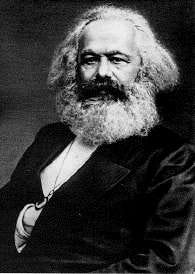Marx, Emanuel, and Obama, Oh My!
* Matt Bianco is an elder in the PCA. He is a married, homeschooling father of three.

Karl Marx had a certain theory of ideas, one that we see in play even today. Well, Marx had a lot of ideas and theories that we see being enacted and lived out today, but one specifically I want to consider in this post.
Karl Marx believed that ideas resulted from our experiences, specifically the situations we faced in life. What is he saying? Well, first, what is he not saying? Marx is not just saying that there are ideas, norms, that make up life–that allow us to make sense out of life–whose interpretation and application are simply colored by our experiences. For example, as a postmillennialist, I believe that history is heading in a certain direction, to wit, a positive direction in which the rule of Jesus Christ will be experienced and known in history. I believe this; it is a norm in my life, but my interpretation and application of it can be colored by my experiences. If my life goes fairly well, I have a successful career and a Godly, happy family, I see these as the fruits of history heading in that direction. If my life is a bit rougher, and I experience the pain and suffering of sickness and death in my family, then I see these as the crosses by which the Kingdom will be made manifest. In both cases, I continue believing in the norm of a postmillennial future. In the former case, I see that happening without too many hiccups, while in the latter case, I emphasize the cross as the means to that future. This, however, is not what Karl Marx is describing.
No, what Karl Marx is describing, rather, is more akin to the now infamous line by Rahm Emanuel. Rahm Emanuel was President Obama’s Chief of Staff and is now the mayor of Chicago. He is famous for having made this statement:
You never want to let a serious crisis go to waste. And what I mean by that, it’s an opportunity to do things you think you could not do before.
Marx may in fact be describing what Emanuel was implying–actually what he was explicitly calling for. Because Marx believed our ideas were not normative but shaped by experience, he believed that our ideas were being controlled by the bourgeoisie who controlled our experiences. Thus, he needed a revolution to get the “little” people in charge so that they could control the experiences and therefore the ideas. More than that, though, you could manipulate ideas based on the experiences people were having. It is this latter meaning that Rahm Emanuel is pointing to. And it is exactly what President Obama is not letting go to waste in light of the incident at Sandy Hook. President Obama is flying hand-picked relatives of those who died at Sandy Hook aboard Air Force One for a short trip to Washington.
What will they be doing in Washington? They will be lobbying the Senators who are opposing President Obama’s gun legislation. President Obama is taking a crisis, an experience, and not letting it go to waste, but rather is using it to form the ideas that he wants Americans and their political representatives to have.
That is not all Marx meant by his theory of ideas, though. In rejecting normative ideas and claiming that ideas were controlled (along with the experiences that formed them) by the bourgeoisie, Marx was rejecting absolute truth. To him, truth was invented by us based on the experiences we faced. Moreover, truth was ultimately invented by those who controlled our ideas and our experiences, the bourgeoisie. Hence, the necessity of a revolution to overthrow them and replace them with the masses. In this way, the masses would control truth.
Even this latter understanding of Marx’s theory of ideas is not outside of the realm of what Rahm Emanuel would have meant by his statement, nor of what President Obama is hoping to accomplish by not letting the Sandy Hook crisis go to waste. Truth is invented, even for them, and a crisis–Sandy Hook–is an opportunity to create a new truth, new ideas, for the American people they are seeking to control.
Ideas have consequences, they say, and I’m not one to disagree on that. Society’s rejection of absolute truth, our rejection of normative education, our rejection of stories, myths, fables, fairy tales, fantasy, and more have all destroyed the very imagination we need to embrace norms like heroes, virtue, bravery, courage, truth, dragons, and dragon-slayers. All we are left with is the genesis of ideas out of our experiences. It wouldn’t surprise me to find out that neither President Obama or Rahm Emanuel have ever read Tolkien or Lewis, Chesterton or Sayers, Dante or Milton. Neither would it surprise me to find out they have read Marx.
<>поисковая оптимизация а стоимость
The post Marx, Emanuel, and Obama, Oh My! appeared first on Kuyperian Commentary.

